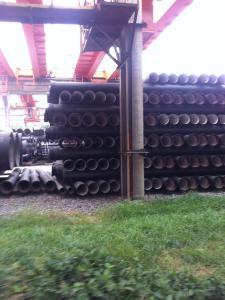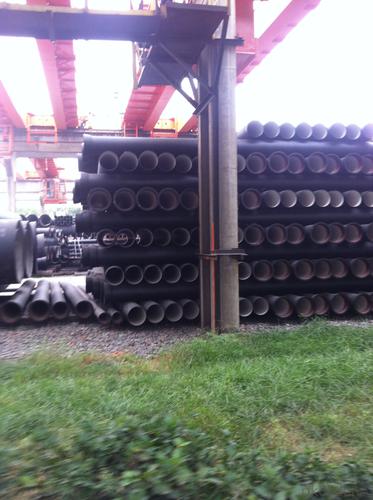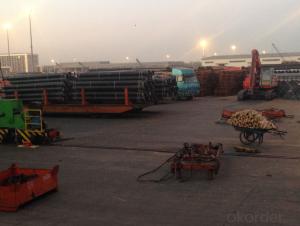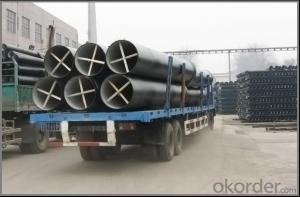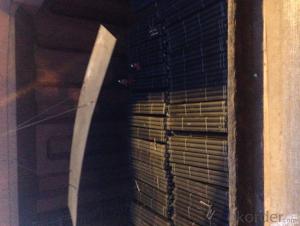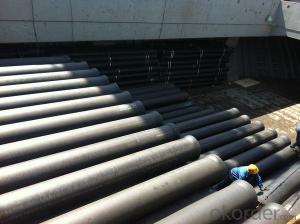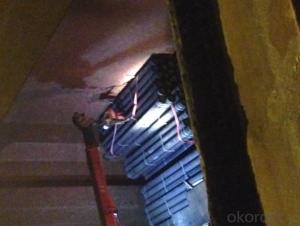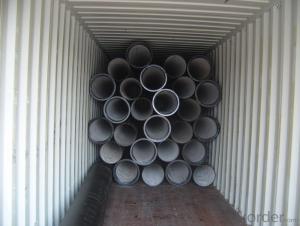DUCTILE IRON PIPES AND PIPE FITTINGS C 40 DN100
- Loading Port:
- Tianjin
- Payment Terms:
- TT OR LC
- Min Order Qty:
- 200 m.t
- Supply Capability:
- 30000 m.t/month
OKorder Service Pledge
OKorder Financial Service
You Might Also Like
Material : Ductile Cast Iron
Size Range : DN 80mm to DN 2000mm
Unit Effective Length : 6m or 5.7m
Manufacture Standard: ISO 2531:1998/ EN 545:2006/EN 598:2007
Annual capacity : 200,000 tons
Coating Exterior: Zinc 130g/m2 according to ISO 8179-1 and bitumen coating 70 microns.
Cement Interior: Portland Cement/ High Alumina Cement/ Sulphate Resisting Cement Lining according to ISO 4179
Special requirements on external coating and internal lining can be applied
We also provide accessories such as SBR/EPDM rubber gaskets, lubricant paste, pipe caps, PE sleeves, etc.
Additional Parts:
Each pipe is strictly inspected according to related standard to ensure permanently high performance.
Easy Installation at site and service free for life
Long Service Lifespan
Quotation will arrive you within 24hours once we get your inquiry.
We guarantee offering you a competitive price.
A copy of original inspection reports of pipes will be offered after shipment.
Photos of loading process will be sent to the customer after shipment effect.
We will follow-up the delivery progress after shipment effect and update to the customer on weekly basis.
- Q: What is the expected burst pressure of ductile iron pipes?
- The expected burst pressure of ductile iron pipes can vary depending on several factors such as the pipe's diameter, wall thickness, and the specific grade of ductile iron used. However, ductile iron pipes are typically designed and manufactured to withstand high pressure loads. On average, ductile iron pipes have an expected burst pressure ranging from 350 psi (pounds per square inch) to 700 psi. However, it is important to note that this is a general range, and the actual burst pressure can be higher or lower depending on the specific design and manufacturing standards followed. To determine the exact expected burst pressure for a particular ductile iron pipe, it is recommended to consult the manufacturer's specifications or relevant industry standards such as the American Water Works Association (AWWA) C150 or ISO 2531, which provide guidelines for ductile iron pipes and their performance under various conditions. Additionally, local building codes and regulations may also provide specific requirements for ductile iron pipe installations.
- Q: How does ductile iron pipe perform in seismic areas?
- Ductile iron pipe performs well in seismic areas due to its inherent strength and flexibility. Its ability to withstand ground movement and vibrations makes it a reliable choice for underground infrastructure in regions prone to earthquakes. Additionally, its robust construction and high resistance to corrosion and damage ensure its durability and safety even in seismically active zones.
- Q: Can ductile iron pipes be used for pressure reducing stations?
- Yes, ductile iron pipes can be used for pressure reducing stations. Ductile iron pipes have high strength and durability, making them suitable for handling high-pressure systems. Additionally, their corrosion resistance properties make them a reliable choice for long-term use in pressure reducing stations.
- Q: Can ductile iron pipes be used in areas with high soil salinity?
- Indeed, areas with high soil salinity can accommodate the use of ductile iron pipes. These pipes possess notable resistance to corrosion, rendering them compatible with different soil conditions, even those with elevated salinity levels. Usually, these pipes are coated with a safeguarding layer, such as polyethylene or zinc, which bolsters their capacity to ward off corrosion caused by saltwater or saline soils. Furthermore, employing appropriate installation methods, such as meticulous backfilling and soil compaction around the pipes, can effectively mitigate the potential consequences of high soil salinity on the durability and effectiveness of ductile iron pipes.
- Q: Can ductile iron pipes be installed outdoors?
- Ductile iron pipe is a kind of cast iron. It is an alloy of iron, carbon and silicon.
- Q: What is the expected deflection of ductile iron pipes under load?
- The expected deflection of ductile iron pipes under load can vary depending on various factors such as the diameter, wall thickness, type of soil, and the magnitude and distribution of the load. However, generally speaking, ductile iron pipes are designed and manufactured to have minimal deflection under typical loads and are known for their high strength and stiffness.
- Q: What is the average weight of ductile iron pipe?
- The average weight of ductile iron pipe varies depending on the size and thickness of the pipe. However, on average, ductile iron pipes can weigh between 300 to 600 pounds per linear foot.
- Q: How are ductile iron pipes different from other types of pipes?
- DI pipes, also called ductile iron pipes, possess unique properties and are manufactured differently from other pipe types. They are specifically designed to withstand high-pressure systems and offer exceptional strength and durability, setting them apart from PVC, steel, or concrete pipes. One significant distinction lies in the material used. DI pipes are made from a type of cast iron containing additional elements like carbon and silicon, which give them remarkable strength and flexibility. This composition enables DI pipes to handle high-pressure systems, making them suitable for applications requiring reliable water supply, such as water mains, sewer systems, and industrial pipelines. Another distinguishing feature of DI pipes is their ability to endure external loads and pressure. They possess high tensile strength, enabling them to bear heavy loads without cracking or breaking. This property makes them ideal for underground installations, where they can withstand the weight of soil, traffic, and other external factors. Furthermore, DI pipes exhibit excellent corrosion resistance. They are coated with a protective layer, typically through cement lining, which safeguards against rust and corrosion caused by the elements, chemical reactions, or transported fluids. This corrosion resistance significantly extends the pipes' lifespan, reducing maintenance and replacement costs over time. Additionally, DI pipes offer great flexibility. They are renowned for their ductility, meaning they can deform under stress without fracturing, making them less prone to cracks and leaks. This inherent flexibility allows them to withstand ground movement and seismic activities, ensuring a safe and reliable water distribution system. Regarding installation, DI pipes are relatively easy to handle due to their lighter weight compared to materials like concrete or steel. They are also available in various lengths and diameters, making them adaptable to different project requirements. In conclusion, DI pipes distinguish themselves through their exceptional strength, resilience, corrosion resistance, and ease of installation. These properties make them the preferred choice for numerous infrastructure projects, where reliability and longevity are critical factors.
- Q: How are ductile iron pipes protected against external impact or loading?
- Ductile iron pipes are protected against external impact or loading through various methods and measures to ensure their durability and integrity. Some of the common ways in which ductile iron pipes are protected are: 1. Thickness and strength: Ductile iron pipes are designed with a sufficient wall thickness and high strength to withstand external loads and impacts. This ensures that the pipes can endure heavy loads and resist deformation or cracking. 2. Coatings: Ductile iron pipes are typically coated with protective layers to provide an additional barrier against external impact. These coatings can include cement mortar lining, polyethylene encasement, or epoxy coatings. These coatings not only offer impact resistance but also provide corrosion protection to the pipes. 3. Bedding and backfilling: Proper bedding and backfilling techniques are essential to protect ductile iron pipes from external loads. The pipes are correctly placed and surrounded by suitable materials like compacted granular bedding and backfill, which help distribute the external loads evenly and reduce the risk of pipe damage. 4. Trench design: The design of the trench in which the ductile iron pipes are installed is crucial for protecting them against external impact. The trench dimensions, slope stability, and proper compaction of the backfill are considered to minimize the chances of damage due to external loads. 5. Pipe layout and support: Proper pipe layout and support are vital to protect ductile iron pipes from external impact. Adequate support mechanisms like thrust blocks, pipe anchors, and pipe restraints are employed to absorb and distribute external loads, preventing any damage to the pipes. 6. Protective structures: In areas where there is a higher risk of external impact, additional protective structures are installed to safeguard the ductile iron pipes. These structures can include concrete encasements, bollards, or reinforced concrete slabs, which act as physical barriers against potential impacts. Overall, a combination of factors such as pipe strength, coatings, proper installation techniques, and support measures work together to ensure the protection of ductile iron pipes against external impact or loading. These measures enhance the longevity and reliability of the pipes, ensuring their efficient performance in various applications.
- Q: Can ductile iron pipe be used for underground applications?
- Indeed, underground applications can employ ductile iron pipe. Renowned for its robustness and endurance, ductile iron pipe proves to be well-suited for a multitude of underground uses, including water and sewage systems, gas pipelines, and irrigation systems. Its exceptional resistance to corrosion and external burdens renders it a dependable selection for underground installations, where sustained functionality and structural soundness are pivotal considerations. Moreover, ductile iron pipe's pliability enables it to endure ground shifting and settling sans fracturing or shattering, making it an apt choice for regions susceptible to seismic occurrences.
Send your message to us
DUCTILE IRON PIPES AND PIPE FITTINGS C 40 DN100
- Loading Port:
- Tianjin
- Payment Terms:
- TT OR LC
- Min Order Qty:
- 200 m.t
- Supply Capability:
- 30000 m.t/month
OKorder Service Pledge
OKorder Financial Service
Similar products
Hot products
Hot Searches
Related keywords
